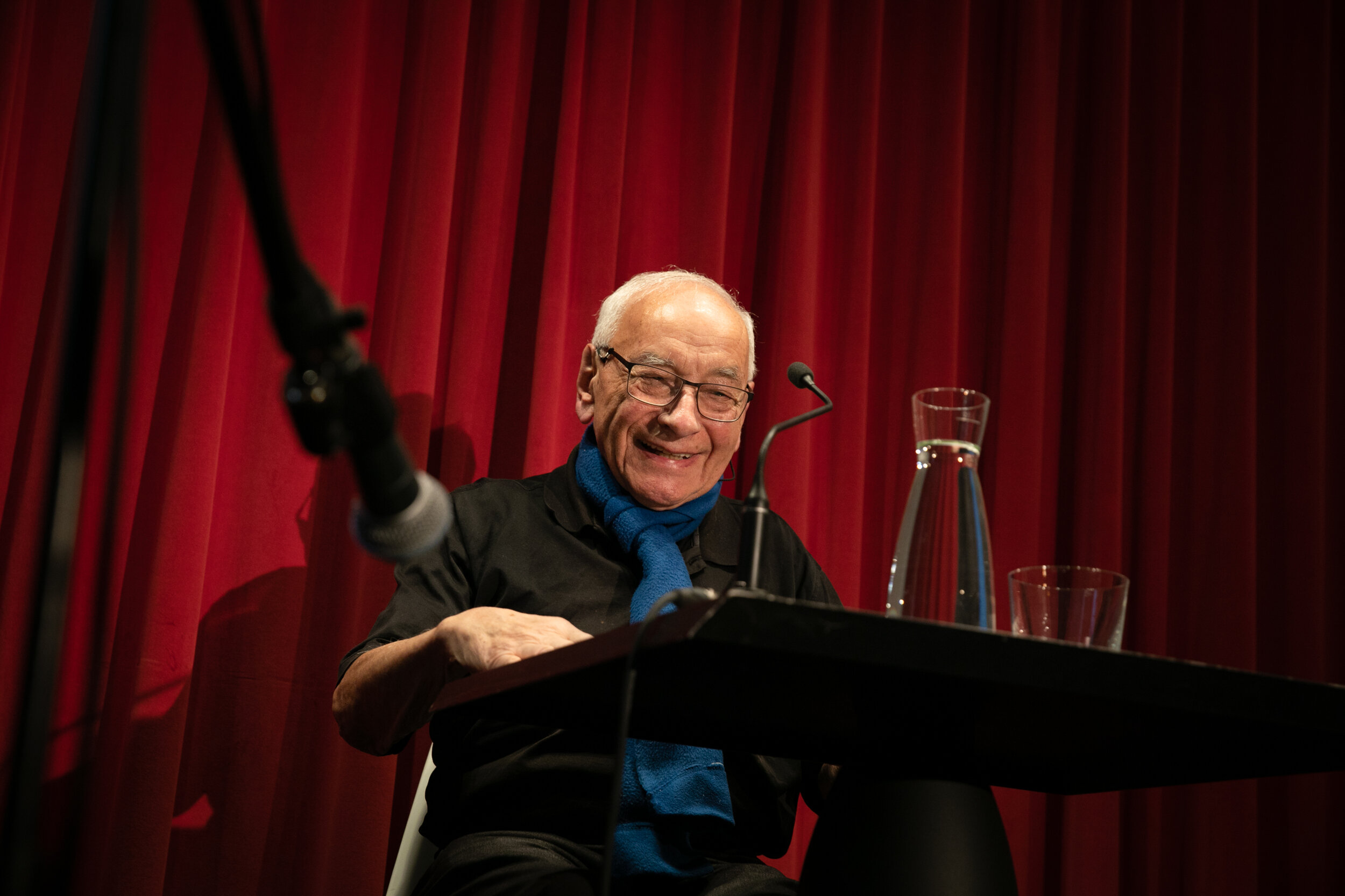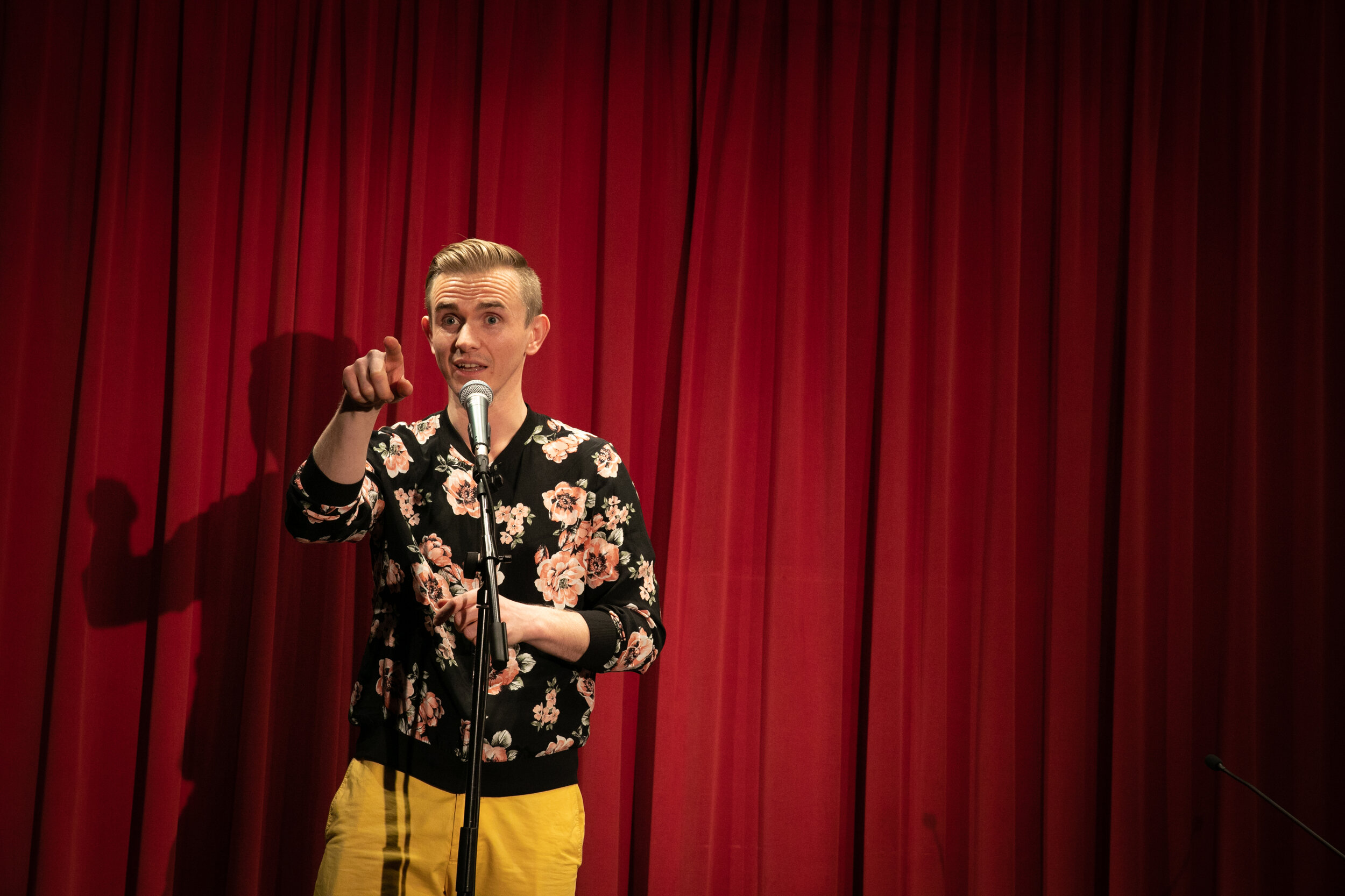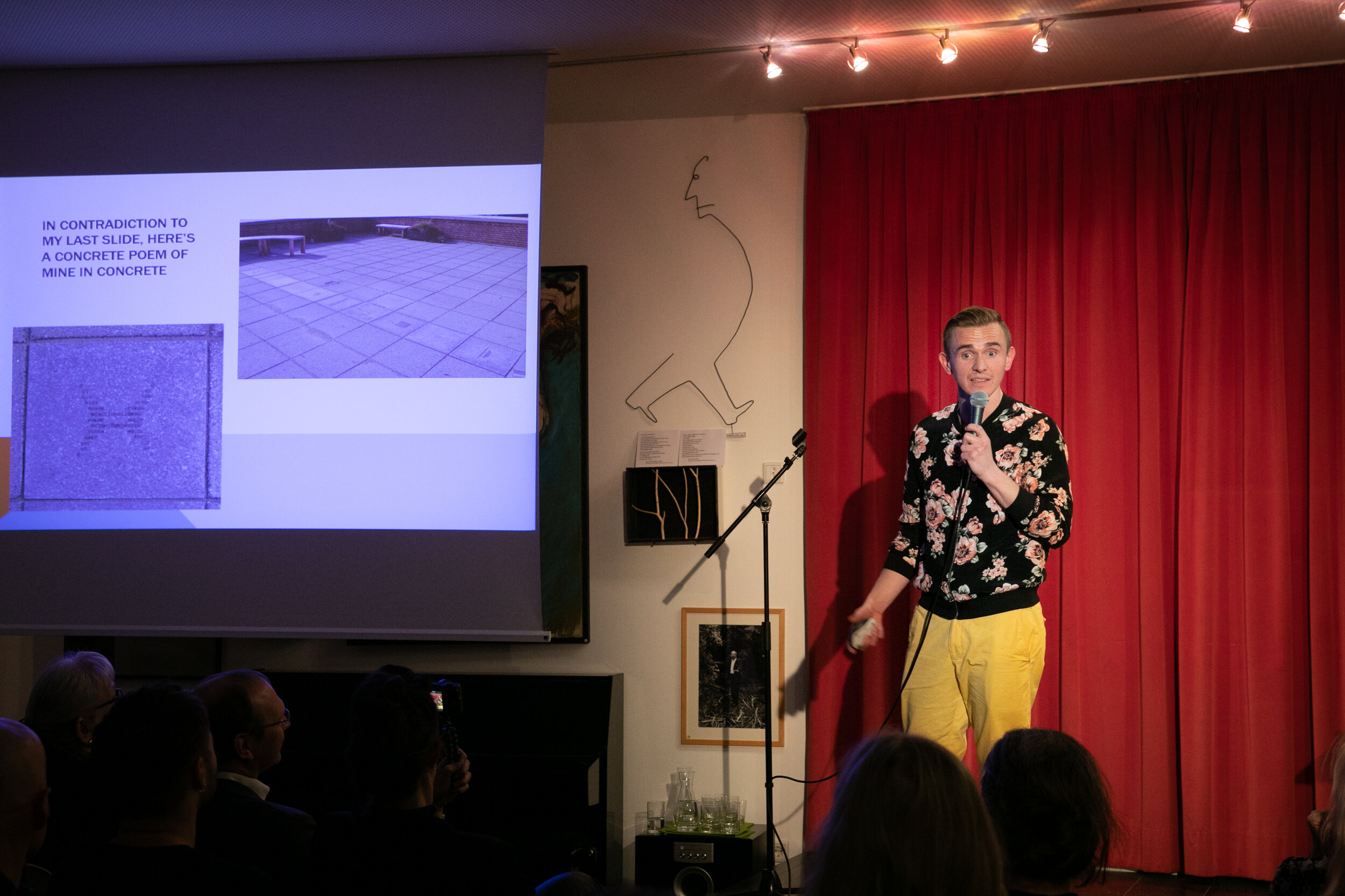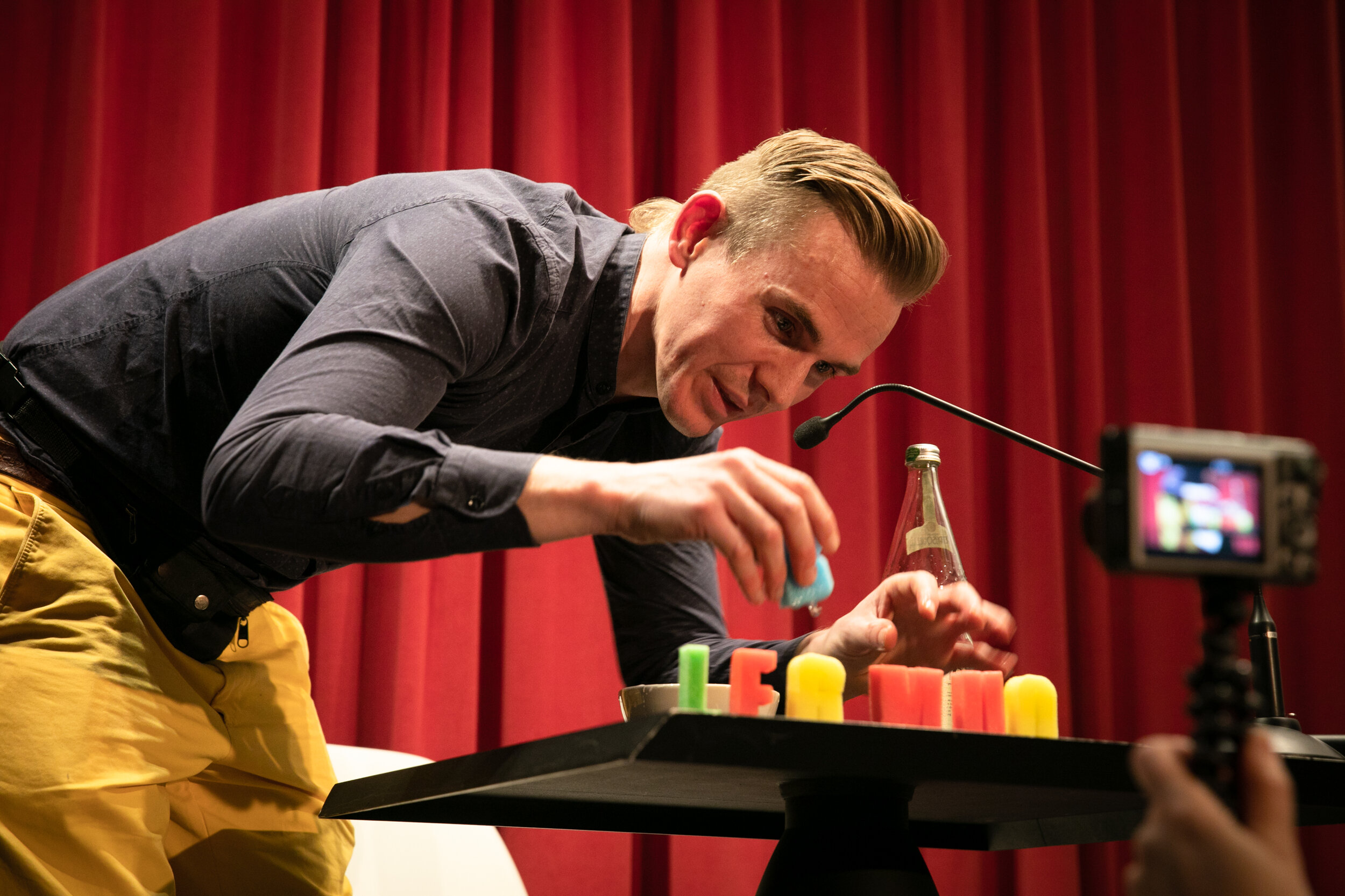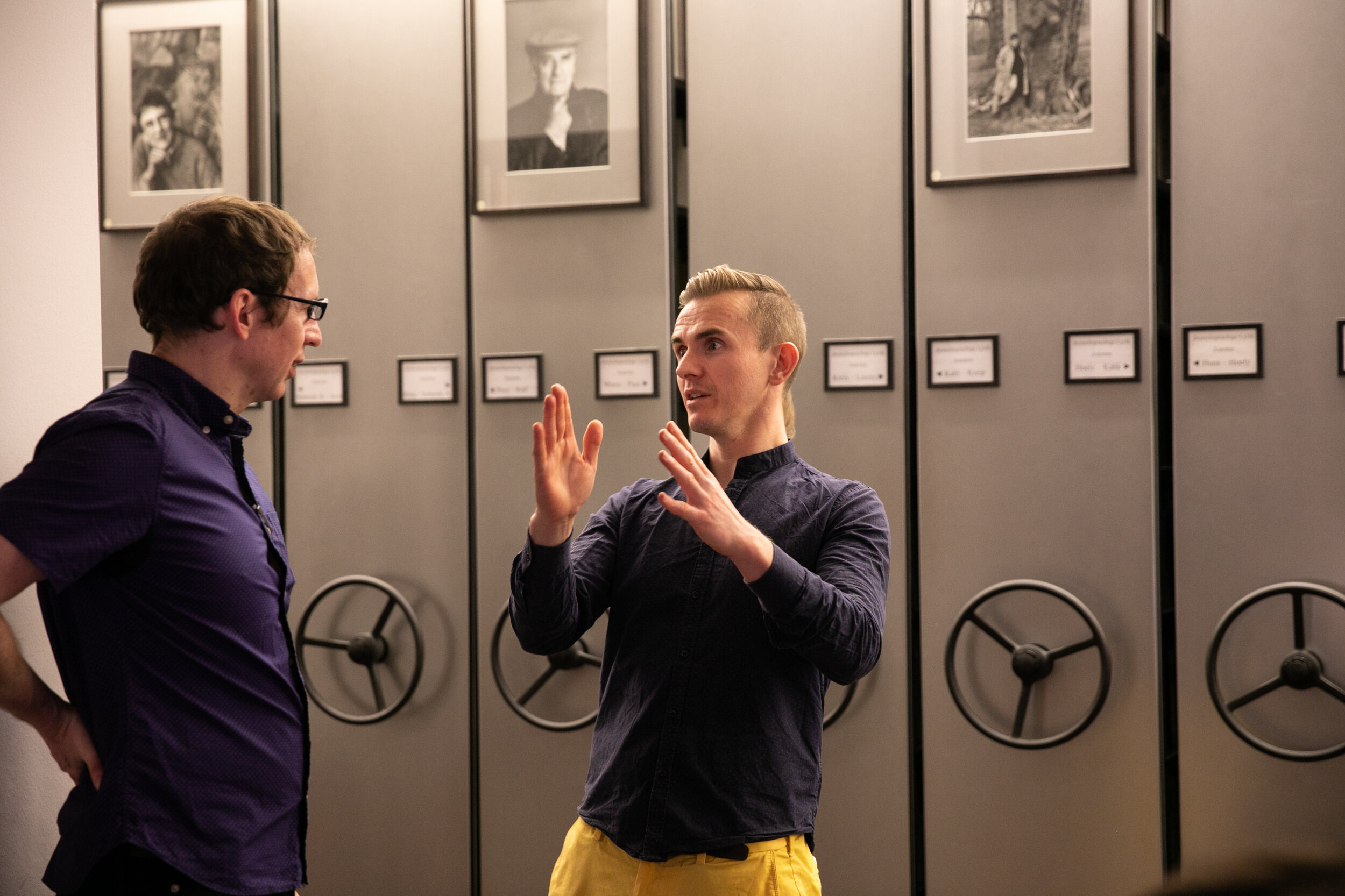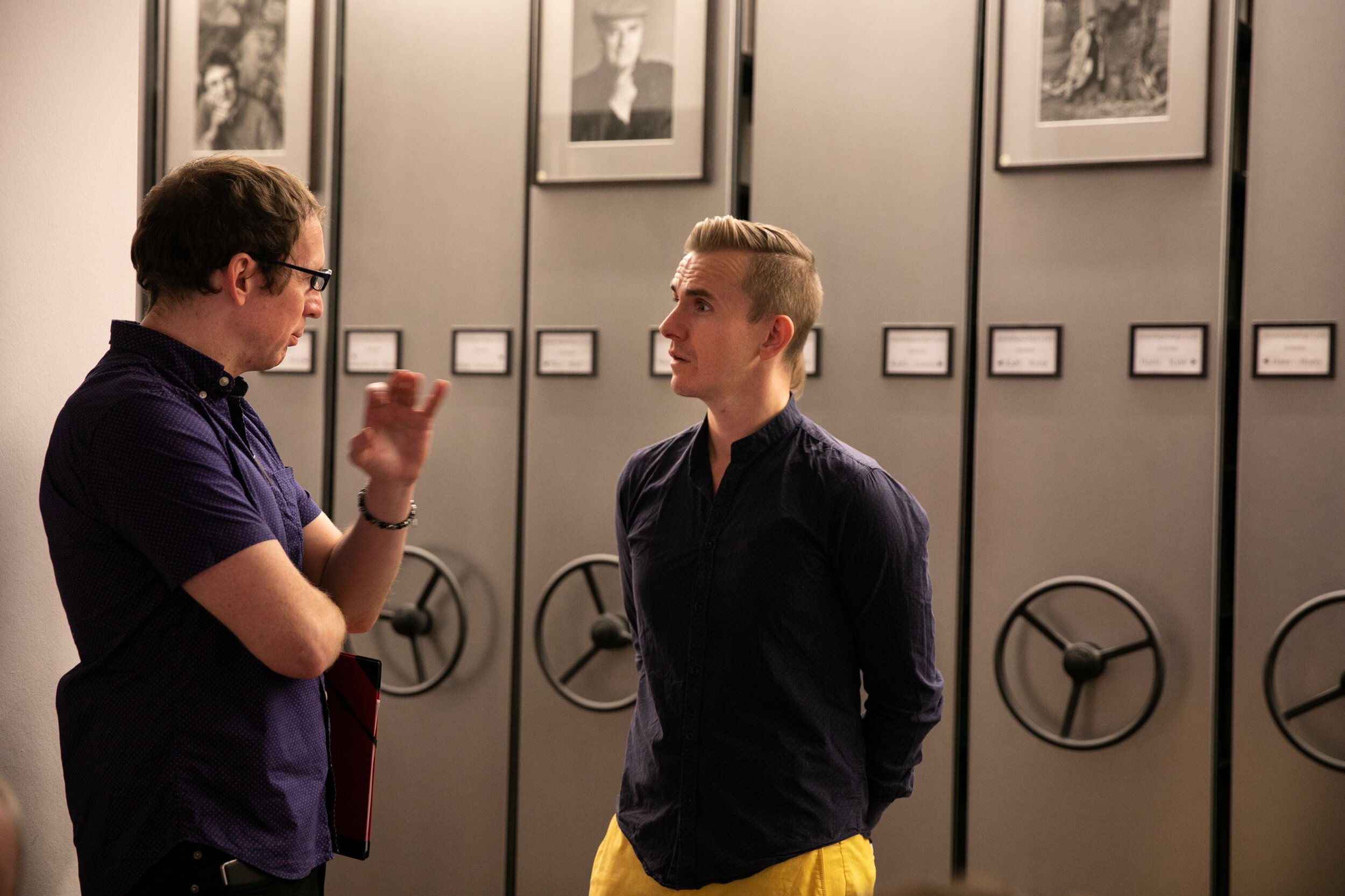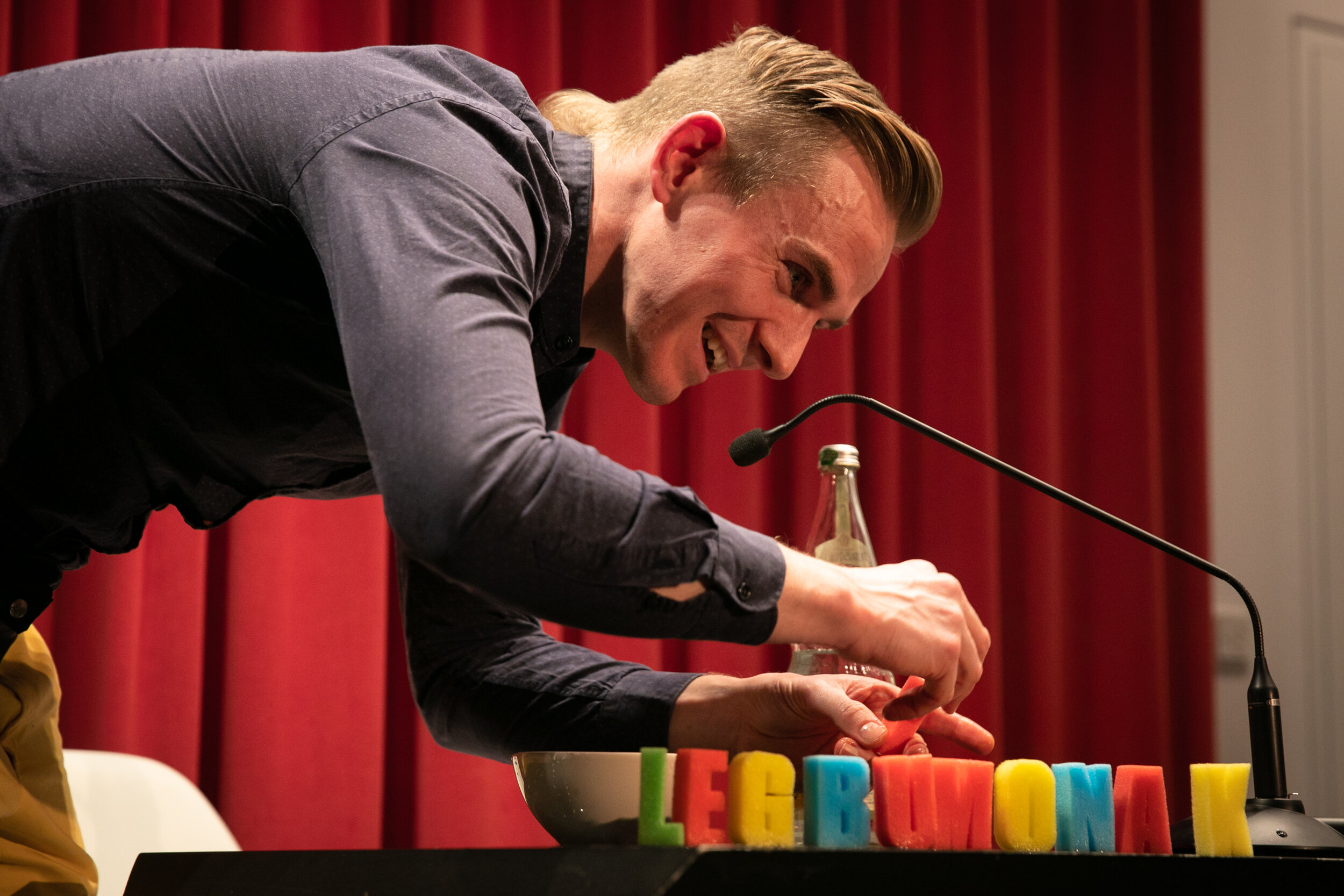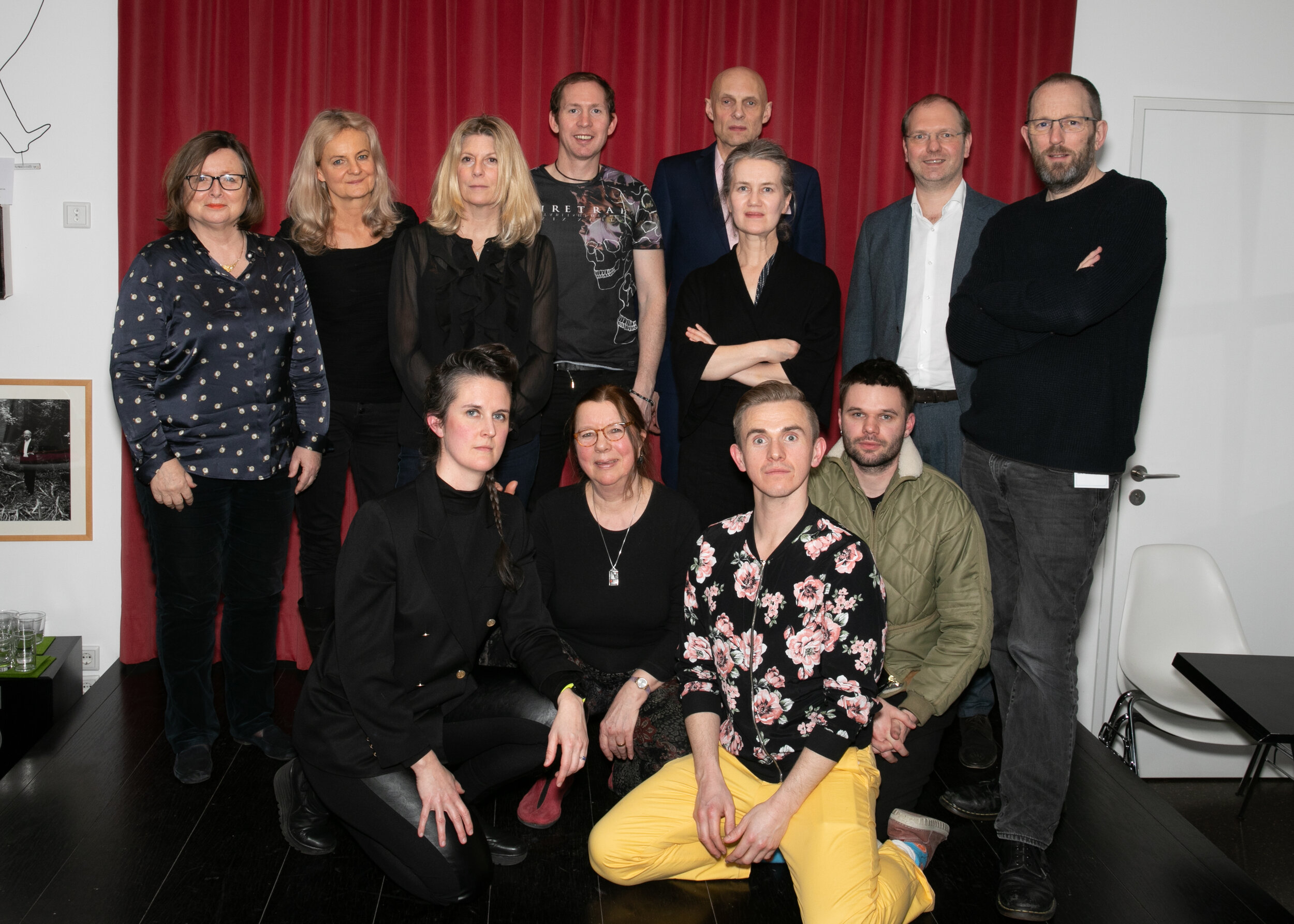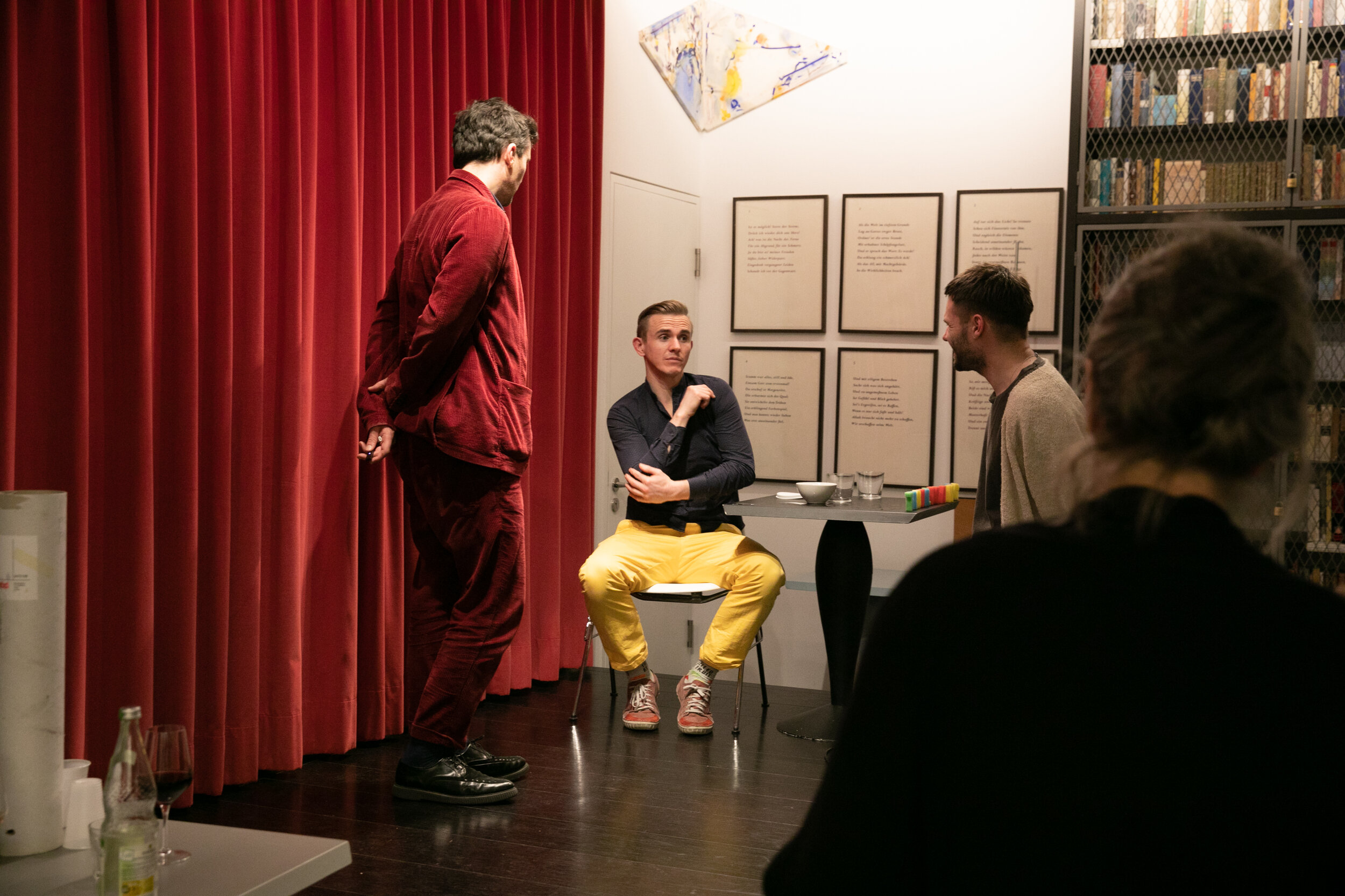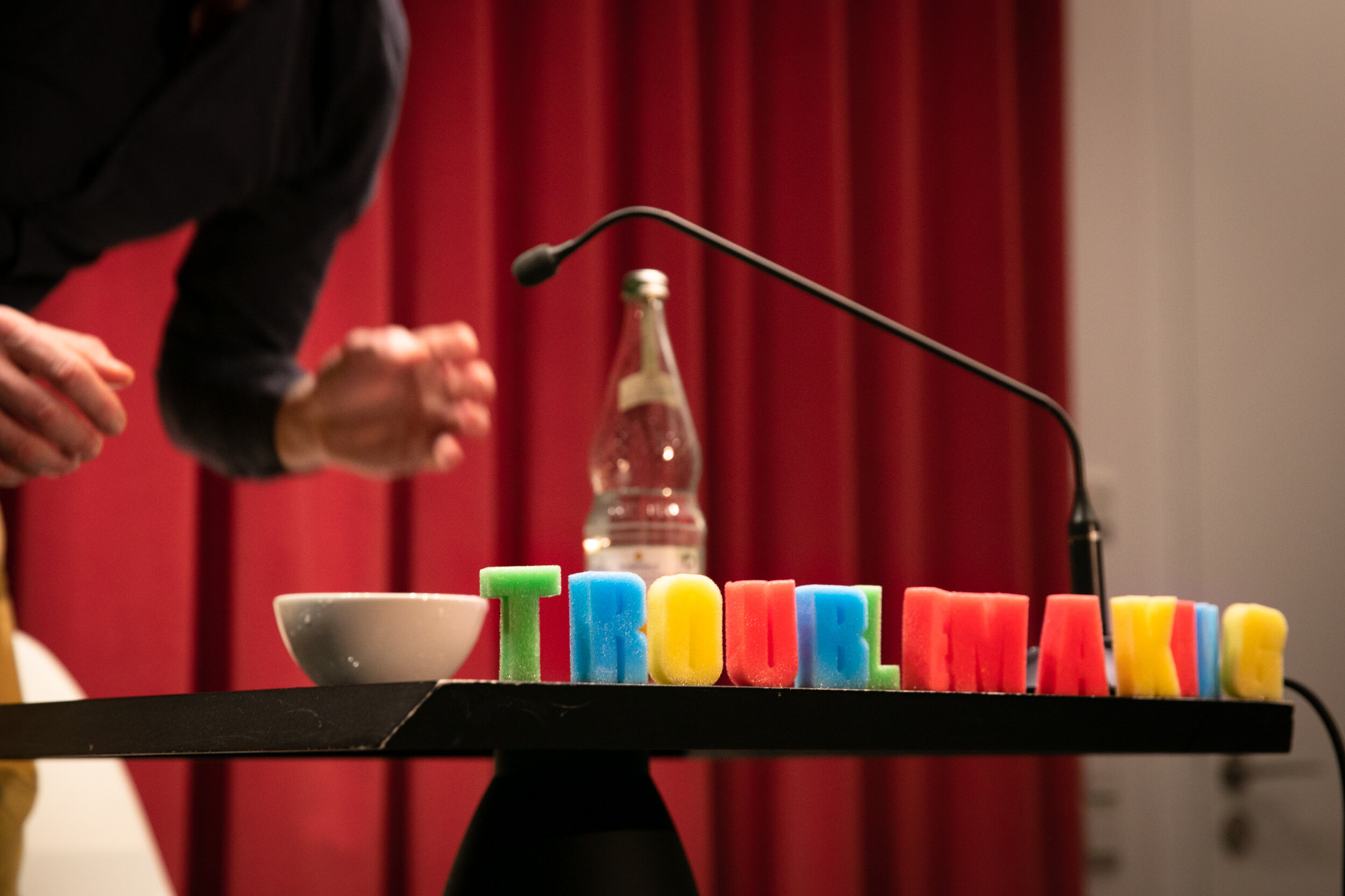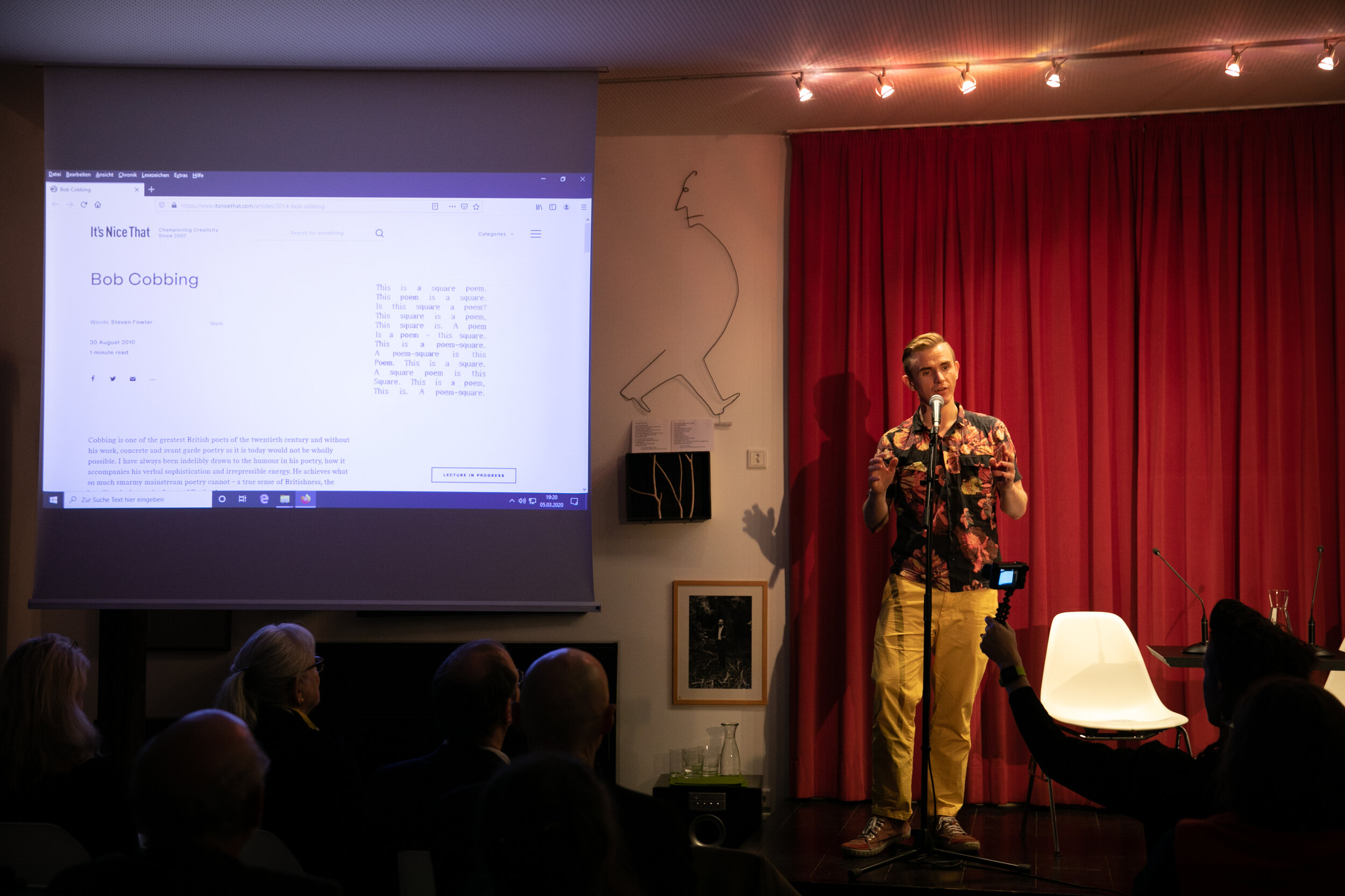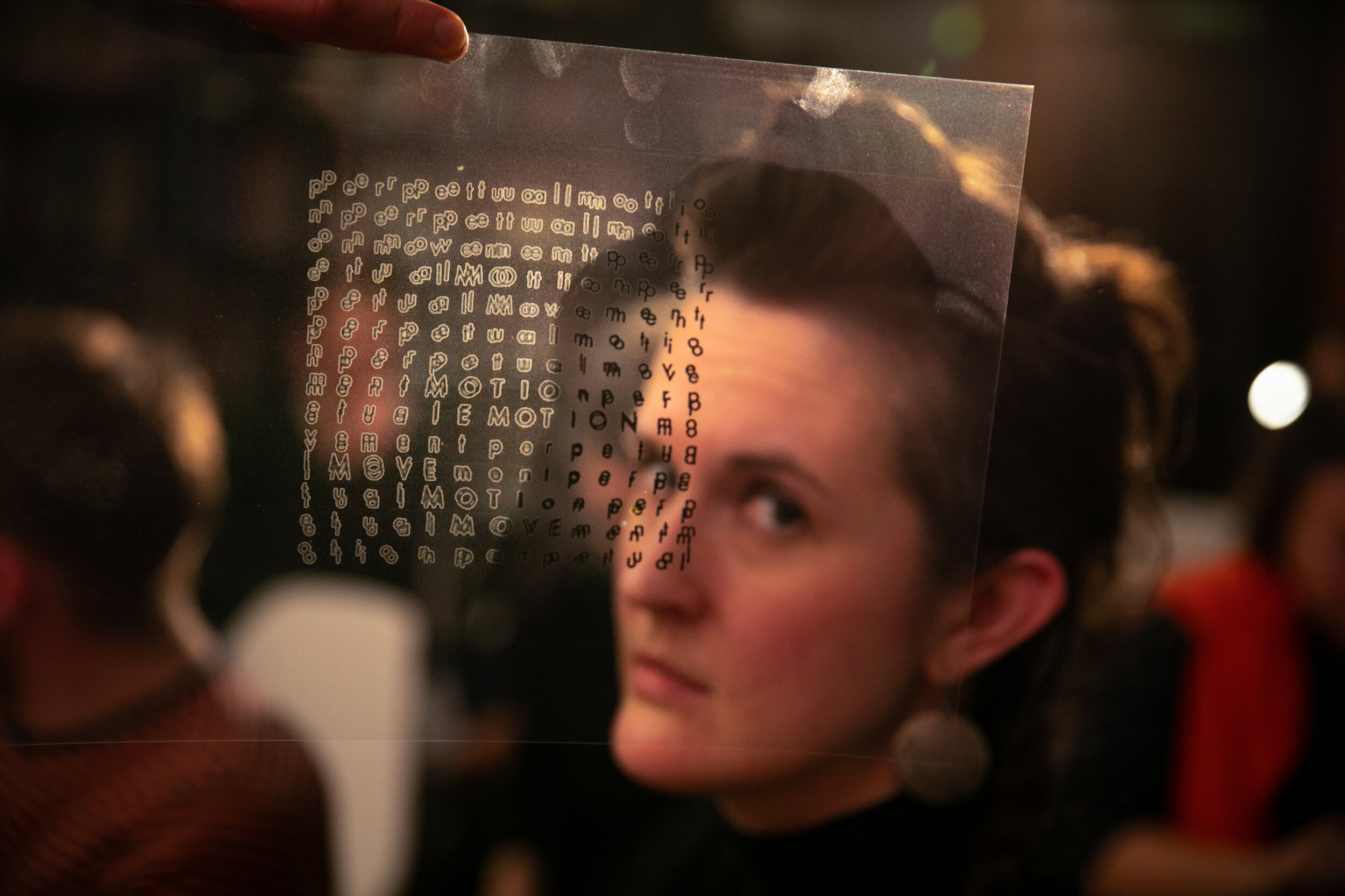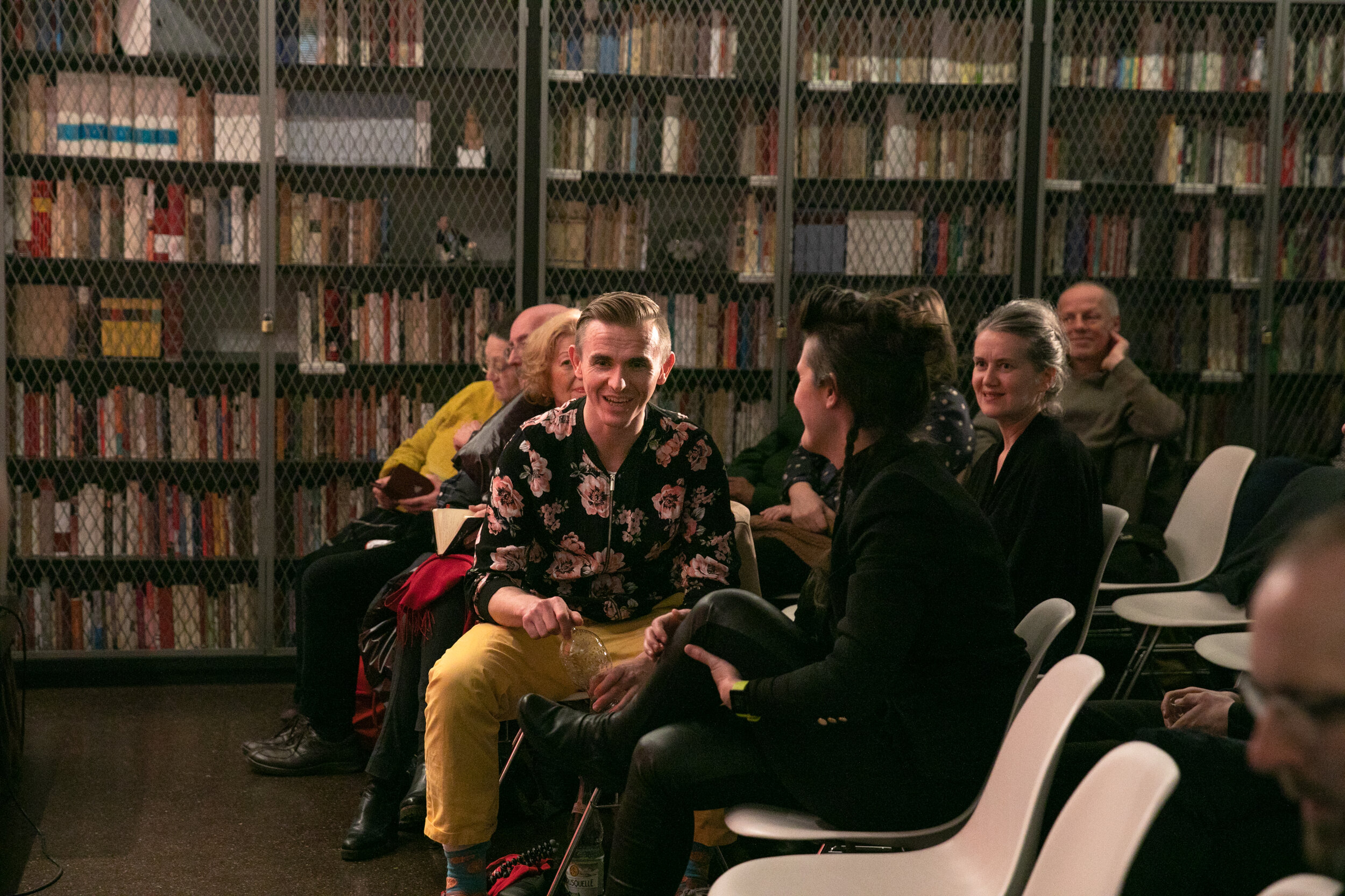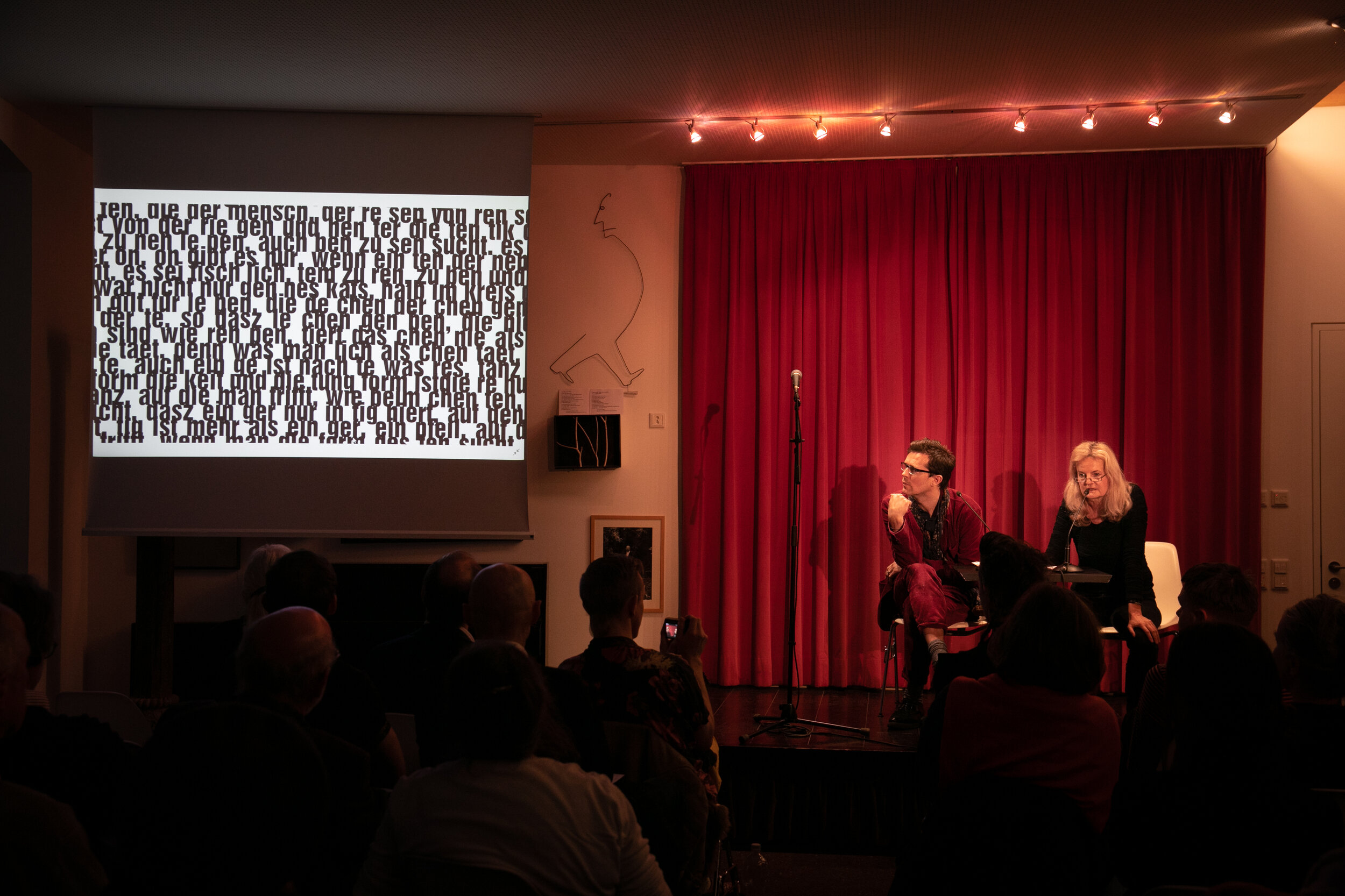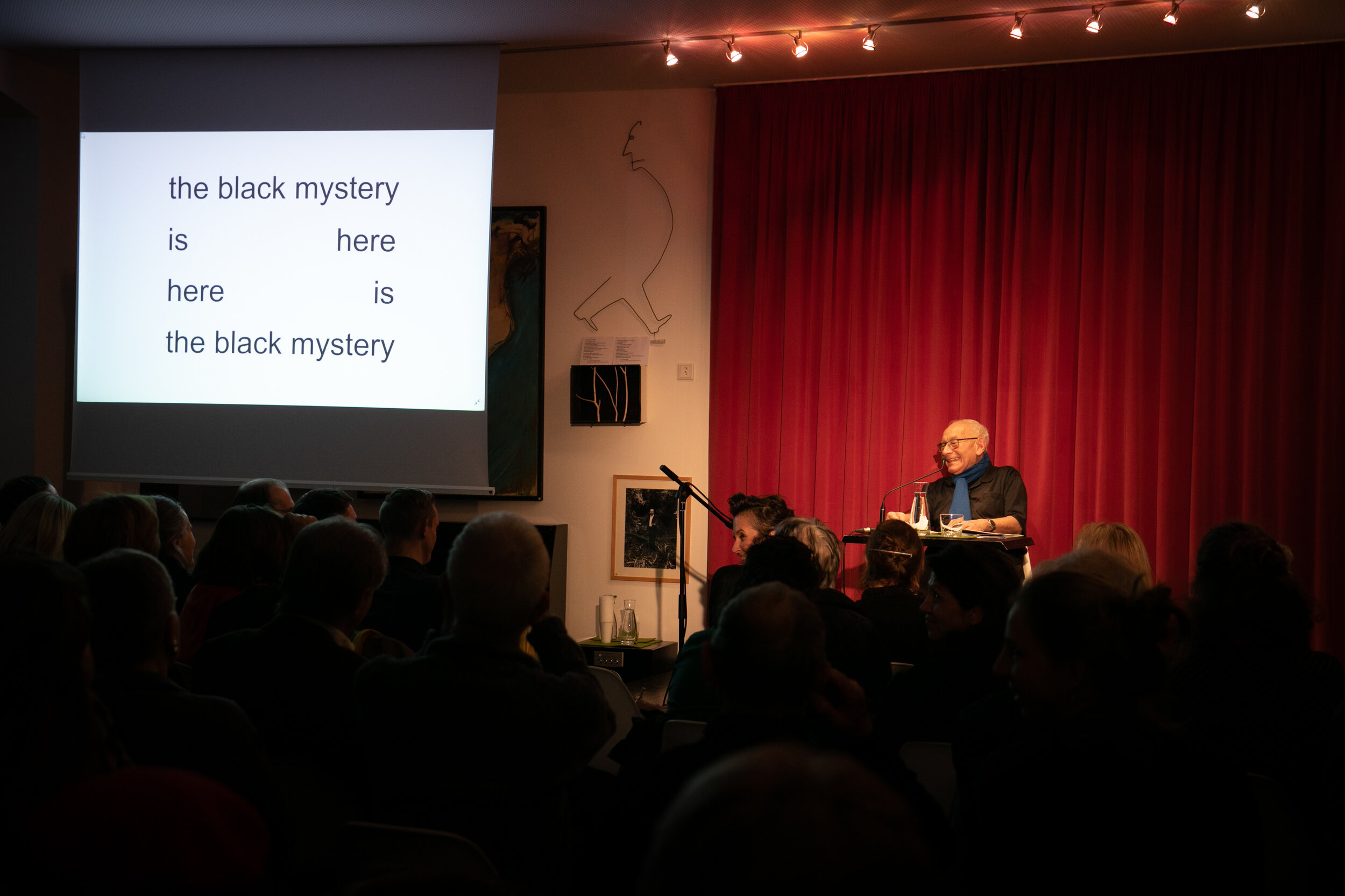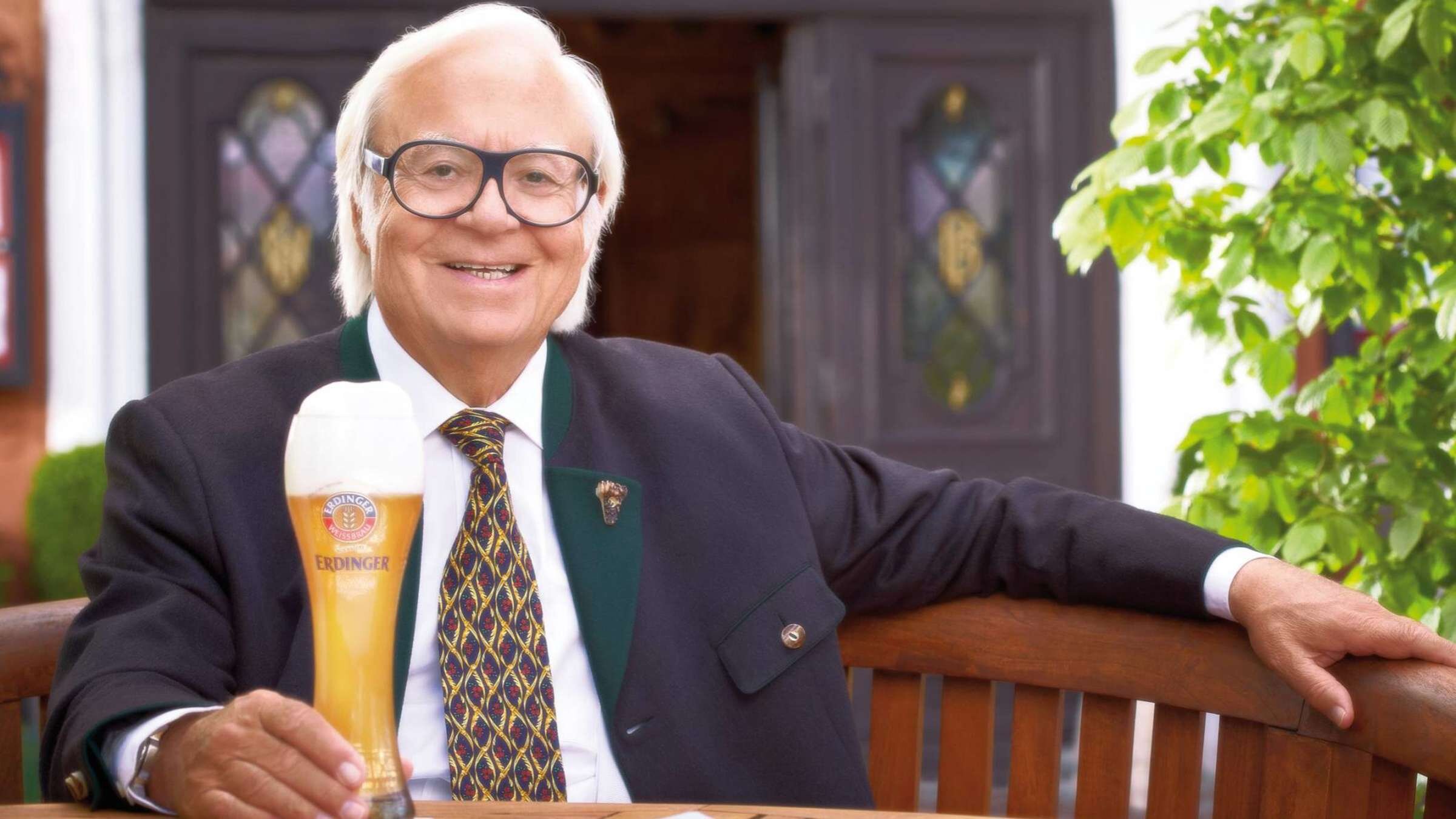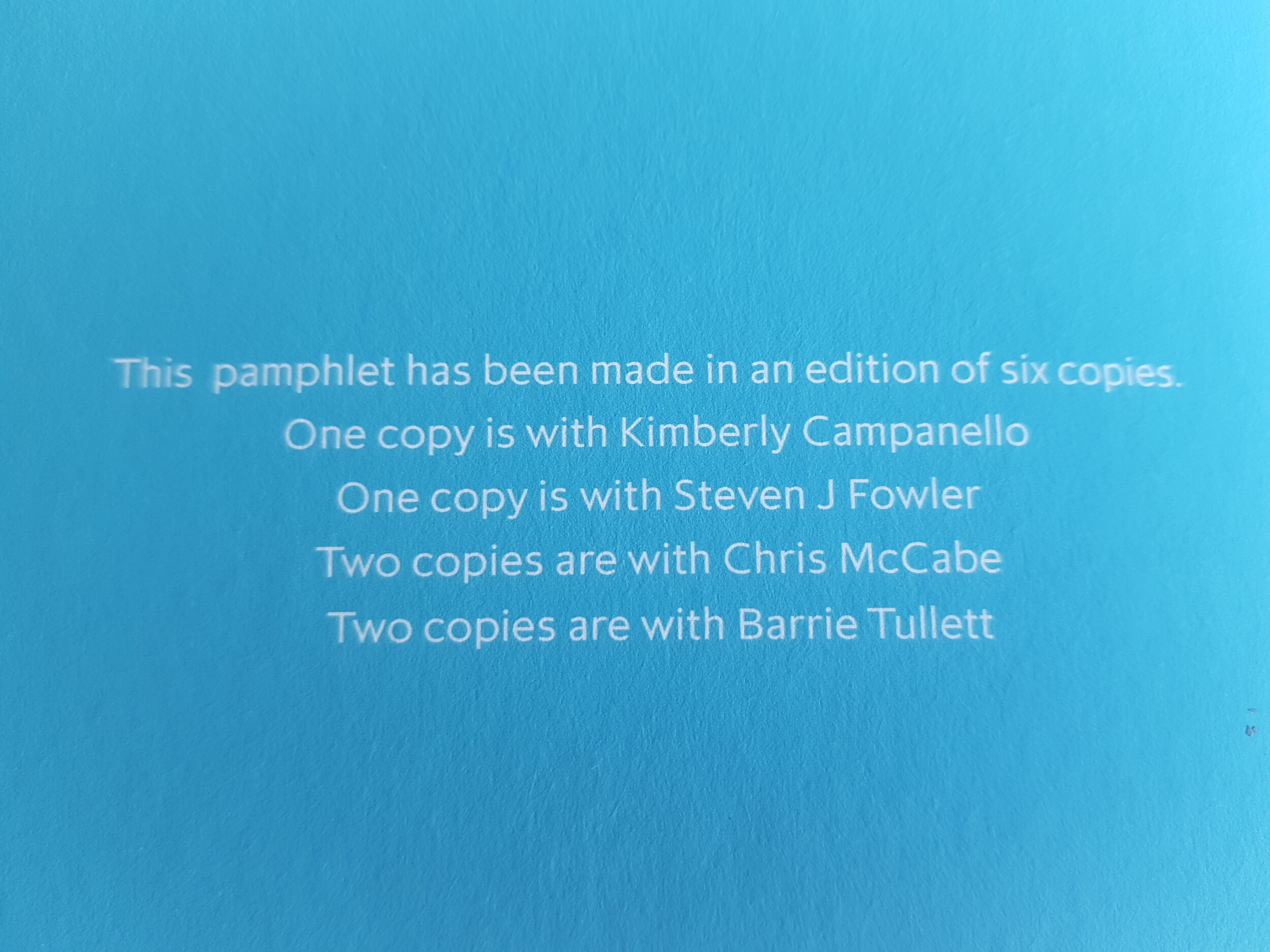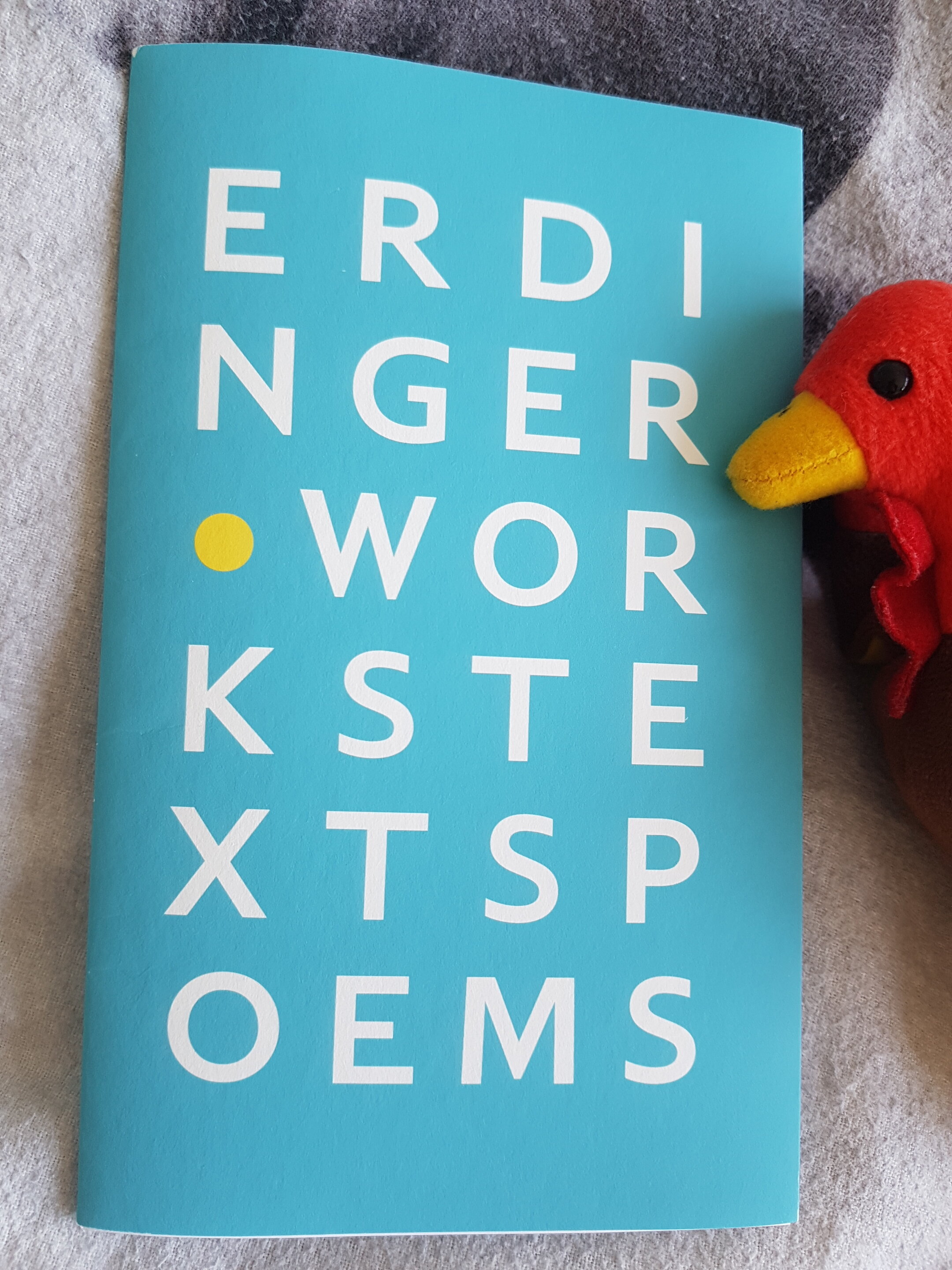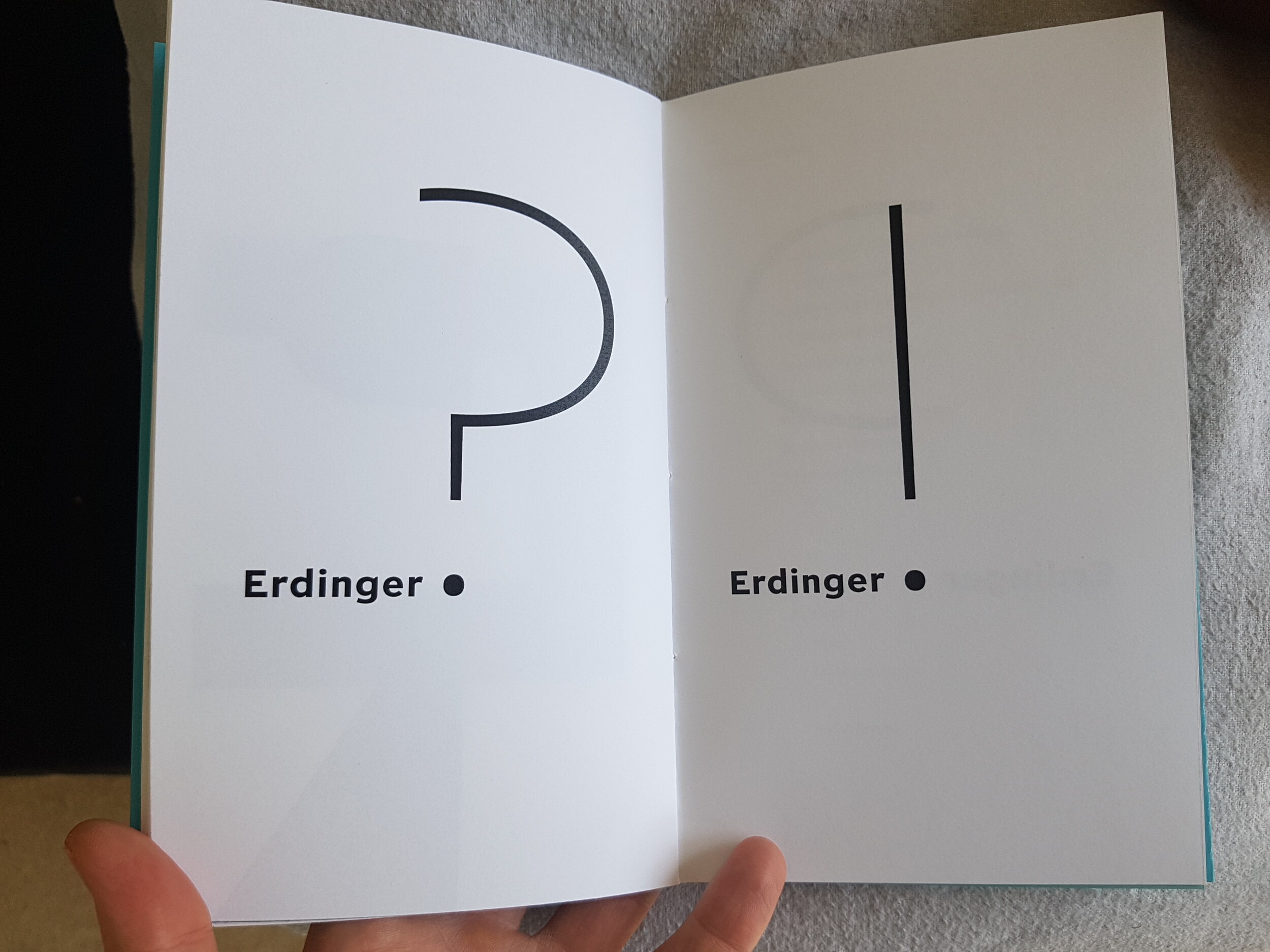KLANG FARBEN TEXT : Munich, March 2020
Klang Farben Text was essentially about the visual properties of language as a creative field, and collaboration. It was built in collaboration about collaboration, and the brilliance and professionalism of Elke Ritt, Chris McCabe and Holger Pils ran through the experience as new friendships. I am left with great respect for them, for how we built the project together. Three constant, kind, deeply clever people. And they brought me into the company of Michael Lentz, Lucy Curzon, Pia Leuschner too. The cohort grew, and then reached out to many fine poets, and the very many generous people of Munich who came to watch us work.
The project was no less than 12 poets from two nations for the better part of a week showing and making in Munich. In the gorgeous surroundings of the Lyrik Kabinett, a really remarkable home for us. Working in pairs, making the live, concrete, visual, kinetic. Presenting poetry from the past. Reflecting, actively and variously and insightfully on what we were doing when we worked in the field of concrete or visual poetry. It was a symposium too, as well as the three big evening gigs we did. We ate together, shared long lunches and dinners, talking of more things than I can remember, we exchanged works and books and concepts and methods. We made things together. We were supported as best as we could be throughout. Again, a rare thing.
The opening night was a high energy introduction to each other, rapid solo performances, interventions and interjections. I can impatient and sometimes hard to impress. Everyone was good. Relaxed, authentic, unpretentious, interesting. I did a wee thing with a misdirection intro and then letter sponges. A companion piece to my Lego poem, done for The New Concrete anthology, which created this whole project in a way.
The second night dipped its footing a little to find it, because perhaps it had too but our concept was being tested. I did a powerpoint presentation, played but maybe lost my tone a little, or it didn’t fly in the crowd. It had some funny poetic-jokes though, I think. The collabs began and were considerable – Victoria Bean and Angelika Bean bringing glossolalia and Kim Campanello and Benedikt Kuhn salvaging each other in the dark.
The final night was a triumph and completed our valley. I had the chance to present on Bob Cobbing and his influence on me, alongside a wonderful presentation by Kim Campanello on Paula Claire. Then the collaborations, Robert Montgomery and Gerhild Ebel, burning alphabets in multicolour, Barrie Tullett and Falkner creating new sculpture poetries, Chris McCabe and Michael Lentz crushing the cross-lingual cross method improv and finishing everything with a killer.
Klang Farben Text feels significant in its understatement. Naturally I most often fail and feel dejected as even successes feel fleeting and often unnoticed yet, fundamentally, I’m trying to do things, creatively and curatorially, that haven’t been done before and would not happen otherwise. I need help from others in that. I need to organise with others. Organisation is a word I like, because it operates in a paradox. That the more you can organise context, the freer and more apparently un-organised content can be. Klang Farben Text was a rare thing and a testament to these principles. It was a moment in our professional lives that began friendships and I hope will have a legacy matching its experience.
A note on : Klangfarbentext in the Süddeutsche Zeitung
August 7, 2020
We snuck in the amazing Klangfarbentext in Munich just before lockdown hit. A dozen of us in Munich, at the incomparable Lyrik Kabinett, hashing out 21st century concrete poetry. http://www.stevenjfowler.com/klangfarbentext
Nice to see the project was covered in the massive german paper Süddeutsche Zeitung with a small article back in March https://www.sueddeutsche.de/muenchen/literatur-zeichen-von-gestern-gedeutet-fuer-heute-1.4830995
Steven J. Fowler told of the 1000 ideas for his performance and the fear of choosing exactly the wrong one. He took the festival title "Sound Colors Text" literally, dipped capital letters in colored water and put them together in a variety of ways to sometimes more, sometimes less meaningful words.
Article on KFT in DeutschlandFunk.de - First Festival of Visual PoetryWords like paintings
https://www.deutschlandfunk.de/erstes-festival-fuer-visuelle-poesie-worte-wie-gemaelde.691.de.html?dram:article_id=471898 By Katrin Hillgruber
Ping and pong, troublemakers and English ladies - onomatopoeic language and pleasurable verbal battles were the focus of the first festival for visual poetry in Munich. Poets from Germany and England celebrated their aversion to semantics and created wonderful sound art.
Writer and poet Eugen Gomringer opens the first festival for visual poetry with onomatopoeic words: “Ping pong - enter a room and cry out: ping! You will see, all the answer is pong. "
A German ping, an English pong or vice versa: The exchange in Concrete Poetry works that easily - and has been since 1953. In that year, Eugen Gomringer presented his “Constellations”, which is still a standard work today, often called l'art pour l ' art misunderstood genre. Now the 95-year-old Swiss-Bolivian poet residing in Upper Franconia delighted the audience in the Munich Lyrik-Kabinett - with a self-confession: “Avenidas y flores y mucheres e un admirador. And this admirador, that's actually my mark. I think I'm an admirer wherever I am, wherever I can join, if I like it I admire it. So, being a poet and being an admirer, that's about one thing, that's a person. "
Participation was the focus of the first British-German festival for visual poetry, which was jointly organized by the British Council and the Lyrik-Kabinett. One of the moderators was Steven J. Fowler, who carried colorful letters in a fanny pack. He laboriously unpacked them on stage, then washed them in a bowl with gurgling mineral water to finally form the word “troublemaker”, troublemaker - an allusion to Brexit?
“Ladies and gentlemen, my name is Steven Fowler and, having been mentioned so many times, I am sure to be a disappointment to you. We are now experiencing twelve very short performances by the aforementioned poet teams who will be here for the next three days and create “sound colors text”. If I weren't one of them myself, I would feel sorry for them, because they now have to follow up on Eugen's incredible twenty-minute performance. We're all ruined now because you were so good. "
The dozen of poets who met in the midst of the bibliophile treasures of the poetry cabinet have one thing in common: their aversion to semantics. In Concrete Poetry everything is taken literally, the word itself becomes material. This was demonstrated by the very visual Gerhild Ebel from Halle.
“The poem can be refined with sweet vowels or with objects cut into cubes. In order to give you a better reception, I have brought this text with me and everyone can take a part of it. " So she spoke and distributed Russian bread to the audience. The Viennese poet with the stage name Falkner and her colleague Barry Tullett, who as a graphic artist insists on not wanting to be a poet, turned their communication difficulties into art.
“Barry and I decided at a very early stage of our cooperation that we wanted to work with the fact that Barry doesn't speak a word of German and won't understand my manifesto. We didn't translate it, for him it was structure and rhythm right from the start. "Barry Tullet replies: "I cannot hold back from performing the diacritical marks of Manifesto 55."
The British counterpart to the Lyrik-Kabinett with its 60,000 media library is the National Poetry Library in London. Chris McCabe works there, who speaks with a charming Liverpool accent. In a dialogue with Michael Lentz, McCabe set the furious, acclaimed end of the festival. A sequel in London is to follow:
“So confabulating and easy is English / So zugebrautes Leichtes Englisch / So samen on the heights is English / So ein Samen heats the English / So eggs and ham is English / So sausage and cheese is English / So we exted the folk for English / So we fell and delayed English / So we fell a Lady English / So we are the fallen Lady of English. So, we are the fallen lady in English. "
A note on : Erdinger March 12, 2020
I must admit, before the Klang Farben Text in Munich, and that remarkable project’s constant exchange and collaboration as an active learning experience for me, I had never come across the German sound / concrete poet Raphael Erdinger. It’s thanks to Chris McCabe’s curatorial vision in suggesting we ask the German participants in the project to present on classic concrete poets that this fascinating figure came up. And then over dinner, stories of this anonymous trailblazer so stoked us that it has resulted in a rare reprinting of his work, thanks to Barrie Tullett, in this beautiful limited edition of 6. I have one and you, if you are reading this, cannot have one. But behold
A note on : KLANG FARBEN TEXT in Munich
February 21, 2020
https://www.britishcouncil.de/en/klang-farben-text-visual-poetry-21st-century
Klang Farben Text: Visual Poetry for the 21st Century
TICKETS FOR EACH EVENT WILL BE AVAILABLE ON THE DOOR.
Klang Farben Text is a three-day visual poetry festival taking place at the Lyrik Kabinett in Munich on 3–5 March 2020. There will then be a follow-on event on 8 April 2020 at the National Poetry Library in London, which forms part of the European Poetry Festival.
Inspired by the international concrete poetry movement of the 1950s and 60s the exhibition celebrates how that movement has impacted a new generation of poets and artists. The printed word is transformed into film and performance demonstrating how concrete poetry has transcended beyond the book and printing press into an experiential art form for the 21st Century.
Curated by SJ Fowler and Chris McCabe, both poets, performers and editors of visual poetry, this exhibition aims to create an innovative and dynamic dialogue between UK and German poets and artists. The exhibition builds on the celebrated anthology The New Concrete: Visual Poetry in the 21st Century which was published by the Hayward Gallery in 2015, which was co-edited by McCabe and includes work by Fowler. Klang Farben Text (sound-colour-text) will take the form in performative collaborations between UK visual poets and contemporary German poets and a screening of concrete poetry films produced between the 1960s to the present day.
The UK poets are: Chris McCabe, SJ Fowler, Kimberly Campanello, Barrie Tullett, Robert Montgomery, Victoria Bean.
The German poets are: Gerhild Ebel, FALKNER, Angelika Janz, Michael Lentz, Benedikt Kuhn, Jürgen O. Olbrich, with special guest Eugen Gomringer.
“The international concrete poetry movement of the 1950s and 60s didn't end, it exploded into the work of a new generation of contemporary poets and artists. Klang Farben Text brings this UK and German generation together for a three-day celebration of visual poetry in sound, film and live performance" – SJ Fowler, Chris McCabe, curators
Concrete Poetry Films:There will be a looped series of concrete poetry films throughout the programme. These films document the development of concrete poetry from the 1960s to the current day, demonstrating how the form has extended out from the page into moving image and sound. The aim is to show how the current visual poetry scene remains true to the international focus of the original Concrete poetry movement.
PROGRAMME:THE FORMAT FOR THE FESTIVAL WILL BE:
3 March 2020: evening public event with Eugen Gomringer as ‘keynote’/guest speaker followed by tasters of each of the 12 collaborating poets
4 March and 5 March 2020 evening public events with the collaborating poets (six poets i.e. three pairs per night) One of the public events will feature a whole group performance
One of the public events will feature a whole group performance
Days set aside for collaborative work between the pairs of poets and as a group; organising a performance of a shared text
Each individual performance will also include a very short presentation / reading of a classic UK/German concrete poem. This will help join up contemporary practice with the original concrete movement, as well as enriching the poets by learning of other works from the UK/German culture.
Poets' films to run through the three days on loop. See the Lyrik Kabinett website for more details.
